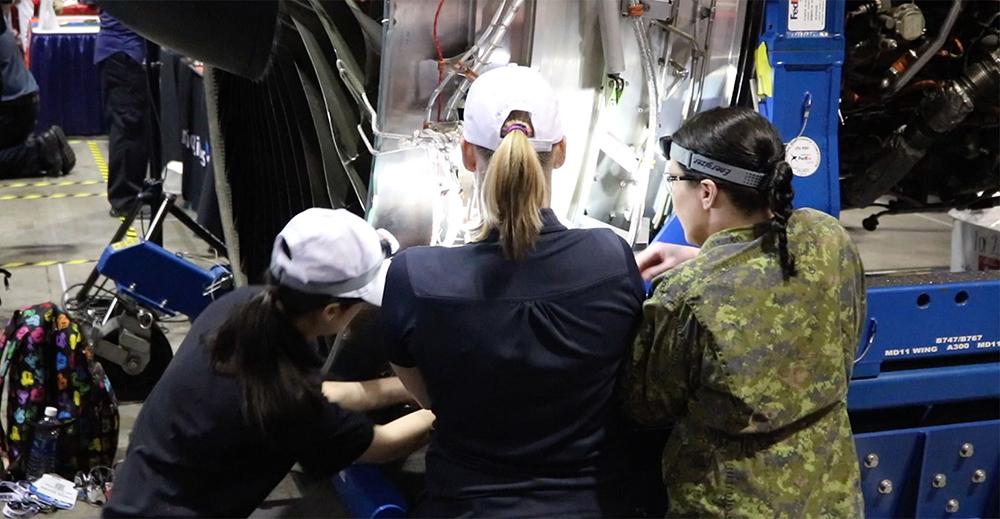Aviation Nonprofit Launches Project To Evaluate, Improve Industry Diversity

A Canadian nonprofit focused on the gender gap in aviation has launched a government-funded project to help the industry better evaluate and improve equity, diversity and inclusion (EDI). Through the Allies in the Workplace project, Elevate Aviation is aiming to tackle both gender barriers in aviation and pandemic-related workforce shortages.
The project has received $460,776 in funding from Canada’s Women and Gender Equality Canada department through its Feminist Response and Recovery Fund as part of the country’s efforts to recover from the pandemic through systemic change in the aviation industry.
“The aviation industry took a huge hit during the pandemic. Through this funding, we will be able to help industry partners continue to put EDI at the forefront, while furthering our mission of helping women and underrepresented groups thrive and succeed through careers in aviation,” says Kendra Kincade, president and CEO of Elevate Aviation.
According to Elevate Aviation, women still make up just a fraction of Canada’s aviation workforce. Women hold approximately 14-17% of the nation’s air traffic controller roles, but only comprise an average of about 6% of pilots and 2% of maintenance technicians. The nonprofit argues that lack of progress on gender quality in aviation has economic impacts, so removing barriers to entry, improving inclusivity and advancing women are keys to the industry’s recovery and long-term sustainability.
The first phase of the Allies in the Workplace project is already underway, during which Elevate Aviation is adapting The Centre for Global Inclusion’s Global Diversity, Equity & Inclusion Benchmarks assessment tools to evaluate the EDI status of aviation companies in Canada. According to Nova Andrews, director of the Elevate Aviation Learning Centre, the benchmarks look at various factors within four core areas across an organization: its mission, organizational structure, policies and procedures; internal recruitment and retention programs; external, public-facing actions; and communication and learning.
Elevate Aviation is first beta testing the project’s evaluation phase with two companies within Canada’s aviation industry: Canadian North Airlines and Winnipeg Airports Authority. It says the companies were selected due to their diverse range of operations, ranging from airline and maintenance operations to flight planning and logistics, as well as their variety of locations that include both urban areas and remote regions with demographics that have a large Indigenous presence.
The beta test companies have chosen a variety of employees from various departments with different experience levels, genders and cultural backgrounds to pilot the assessment tools. They will undergo training to better understand EDI concepts and benchmarks, and to assess actions and progress at their companies. Elevate Aviation will be working with the companies to provide training, identify the biggest challenge areas and help them develop cohesive plans to implement for improving EDI policies and procedures. The 26-month program is on track to be completed in December, at which point Elevate Aviation hopes to expand the project by offering it other aviation companies as a service.
“This project gives us the opportunity to work closely with aviation companies to create physically, emotionally and psychologically safe workplaces for women to ensure equal opportunities for advancement throughout their careers,” says Andrews.
“Most organizations are very new to this and, for the most part, it’s been HR’s [human resources departments] job to work on it … and make sure they’re doing the bare minimum. Not out of bad intent, [but] it’s a matter of resourcing and finding people who have qualifications in this area, and putting that plan into place of having a dedicated person making those changes,” says Andrews. “That’s more than hiring the person and being able to put the finances behind making those changes. It’s a commitment for organizations.”
Andrews says recommended changes could include things such as rewriting policies, providing training or making changes to benefits policies. For instance, Andrews says this could involve reevaluating parental leave plans to remove exclusionary language such as “maternity” and “paternity.”
The nonprofit already has some insight into barriers that prevent women and other underrepresented populations from entering or staying in the industry. It previously conducted a project funded by Canada’s Minister of Status of Women to collect data about these issues. Andrews points out that the industry can seem unapproachable when it comes to the qualifications needed and the cost of training for roles such as pilots or maintenance technicians.
To combat retention issues, Andrews says companies need to demonstrate a clear path for advancement. Part of this, she says, includes diverse representation in middle- to upper-management roles. “When people don’t see [people like] themselves in those roles, they don’t see how they can be in those roles,” she notes.
Within MRO, Andrews says there are still many changes that need to happen to make these types of careers more welcoming to women. “We talk about aircraft maintenance engineers (AME) often because they are such a small population,” she says, citing an example of an AME that serves as an ambassador for Elevate Aviation whose employer was, until recently, still only providing men’s sized clothing to female technicians. “It’s amazing that those things still have to be discussed and are still not considered in the workplace.”
To combat these types of barriers in MRO and other aviation segments, Elevate Aviation provides a mentorship program where women can be paired up with a mentor to guide them through issues such as education pathways, challenges in the workplace, negotiating salaries and working through technical certifications. It also has initiatives in place to attract younger generations to the workforce, including scholarships, speaking tours and youth summer camps.






Comments